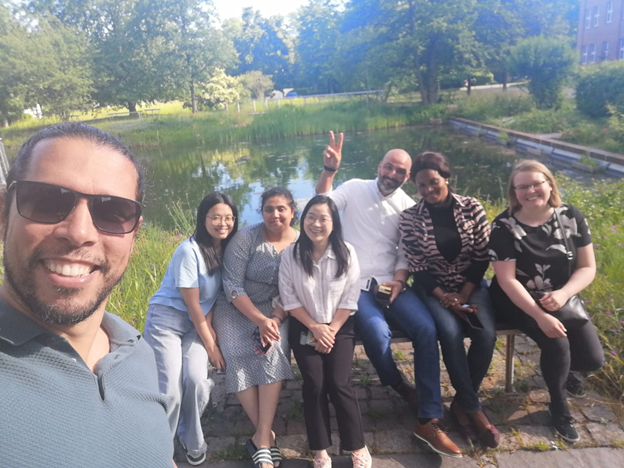Building for the future - using metagenomics to understand agricultural soils

The research study started on the 13th of April and ended on the 7th of July, 2022. I joined the team of Postdoctoral researchers and PhD students in the Microbial Data Science Group at the UFZ, researching biodiversity in different soil environments. I was able to evaluate the Phylogenomic diversity of bulk soil and rhizosphere microbiome of different agricultural environments. My research visit to the MDS group coincides with the launching of the Multi-Domain Genome Recovery v1.0 (MuDoGeR v1.0) framework; a tool developed to help users to recover Metagenome-Assembled Genomes (MAGs) and Uncultivated Viral Genomes (UViGs) from whole-genome sequence (WGS) samples simultaneously. MuDoGeR is an open-source software which acts as a wrapper for several tools. This work, under the auspices of AMI's International Capacity Building Fund gave me the privilege to learn and use this new tool to carry out my research work.
Briefly, Metagenome-Assembled Genomes (MAGs) of 343 agricultural samples of interest from agricultural soil environments, recovered from the Collaborative Multi-domain Exploration of Terrestrial metagenomes (CLUE-TERRA) consortium databases having the highest sequence quality and largest spread around the globe were obtained. Only metagenomes sequenced using the Illumina sequencing were selected. The taxonomy of the bacterial genome was confirmed by running GTDB-TK on the recovered genomes. CHECKM was also carried out to validate the quality of the recovered MAGs: those with sequence quality above 50% were selected for further analysis. Afterwards, DeepARG, a deep learning approach for predicting antibiotic resistance genes from Metagenomic data was employed. The diversity of antibiotic resistance MAGs for each metagenome and the recovered MAGs harboring each of the detected antibiotic resistance genes were identified. Prevalence of resistance genes across different classes of bacteria were determine and across different soil environment. Likewise, microbial community genes across the different soil environment were analyzed in order to identify and characterize unique gene families within the phylogenetic tree. All these processes were achieved using the MuDoGeR framework.
Although the three months study period was very short for comprehensive research, the use of MuDoGer framework in the processing of metagenome samples enabled me to achieve a lot within this short period. The summary of my research engagements during this period includes:
- Recovered 343MAGs of bulk soil and rhizosphere samples from agricultural environment with the highest sequence quality from CLUE-TERRA and TerrestrialMetagenomeDB databases
- Determined the assigned taxonomic classifications of the bacterial genomes.
- Ran CHECKM for evaluation of MAGs quality
- Performed BLASTx searches against Antibiotic Resistance Genes Database (ARDB) using DeepARG.
- Determined the distinct ARG profiles in bulk soil (BS) and rhizosphere (RS) of different agricultural environments
- Evaluate the differences in bacterial community structure among BS and RS samples
The experience, exposure and knowledge gained during this research visit was highly inspiring. The tutorship and guidance received from my host during this period has added greatly to my professional development. This was my first time of carrying out research in a dry Lab and therefore demands the knowledge of programming language. I completed two different certificates courses in “R” and Python (Coursera) and an introduction to bioinformatics using python training course organized by the German Network for Bioinformatics infrastructures (de.NBI). With this acquired skills, I was able to deploy excel and python skills in the metagenomic analysis, use “R” in the analysis of results such as drawing of figures and charts for the first time. I proactively participated in research group discussions meetings and seminar presentations which enabled me to gain insight on the different researches being carried out by PhDs and Postdocs in the group and this has equipped me with research ideas for the future. In addition to learning metagenomic analysis, I was also able to build professional connections with postdocs and PhD students in the group. I am very grateful for this experience and to my host Dr. Ulisses Nunes da Rocha, whose unalloyed support for my interest in microbial data science and bioinformatics has been incredible since I met him 2 years ago and throughout my visit to his research group at UFZ, Germany. I look forward to another scholarship or funding that would enable me to carry out a long-term research project with the MDS group so as to develop my skills and obtain more experience in metagenomic research.
The result of this study is being analyzed and developed for publication in reputable peer-review scientific journals. I also intend to disseminate the result of this research in scientific conferences. I anticipate that through the result of this study will give further insight into the antibiotic resistomes circulating within the rhizosphere microbiomes so as to evaluate the possible impact of antimicrobial resistomes present in the rhizosphere on public health and develop mitigation options for curtailing human exposure through agricultural systems and food consumption.
Adesiyan Ibukun Modupe
